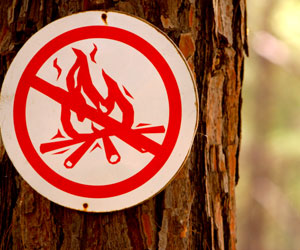By Joe Forward, Legal Writer, State Bar of Wisconsin
 Dec. 13, 2010 – Wisconsin statute does not mandate an award of double damages when a private landowner’s property is destroyed by a forest fire that occurred through negligence, the District IV Wisconsin appeals court recently held.
Dec. 13, 2010 – Wisconsin statute does not mandate an award of double damages when a private landowner’s property is destroyed by a forest fire that occurred through negligence, the District IV Wisconsin appeals court recently held.
As a favor to landowner and business owner Jack Scimeca, Jeffrey Knack lit and maintained a large burn pile of brush, stumps, and building materials at the Lake of the Woods Campground in Marquette County in April of 2003. The fire escaped the pile and burned 572 acres of land.
Landowners impacted by the fire filed a lawsuit against Knack and the campground, alleging negligence, trespass, and nuisance. The parties’ respective insurance carriers were also parties to the suit. Plaintiff insurer Heritage Farms, Inc. sought double compensatory damages under Wis. Stat. section 26.21(1), which provides that in addition to penalties provided by section 26.20, private landowners whose property is destroyed by forest fire may recover double damages “if the fires occurred through willfulness, malice or negligence.”
Section 26.20 deals with damages for a failure of railway corporations to adhere to certain fire protection measures. The defendant insurers argued that section 26.21(1) does not apply unless the negligent party operates a railway. The circuit court concluded that section 26.21(1) only applies to railway corporations that violate section 26.20.
At the conclusion of a four-week jury trial, Heritage Farms obtained a judgment awarding plaintiffs $568,422. The circuit court denied plaintiffs’ motion for reconsideration on the double damages issue. Heritage Farms appealed, and the appeals court affirmed.
The Wisconsin Supreme Court accepted review, and reversed, holding that section 26.21(1) “is not limited to a specific class of tortfeasor such as a railroad corporation, and a violation under Wis. Stat. section 26.20 is not a prerequisite for the applicability of section 26.21(1). The supreme court also held that “gross negligence” was not required to violate section 26.21(1).
On remand, Heritage Farms moved for double compensatory damages and reasonable costs for legal representation, as well as 12 percent interest on the doubled portion of damages.
The circuit court granted attorneys’ fees, but not double damages or interest, reasoning that the case did not present a situation in which the court should use its discretion to impose double damages. Heritage Farms appealed.
Double damages mandatory?
In Heritage Farms, Inc. v. Markel Insurance Co., 2010AP355 (Dec. 2, 2010), Heritage Farms argued that double damages are mandatory once there is a finding of willfulness, malice or negligence. In other words, the statutory word “may” in section 26.21(1) means that a party “may” recover double damages only if the court finds willfulness, malice or negligence. If so found, double damages are mandatory, Heritage Farms argued. The appeals court disagreed.
“Because there is no indication of a legislative intent to give the word ‘may’ anything other than its ordinary meaning, no other construction is warranted,” the appeals court wrote.
Secondly, Heritage Farms argued that even if double damages are not mandatory under section 26.21(1), there should be a “presumption in favor of awarding double damages and costs of legal representation.” Again, the appeals court disagreed.
“Heritage Farms does not cite to any other legal authority supporting its position that an award of double damages under section 26.21(1) should be presumed and we decline to hold that such a presumption exists,” the appeals court wrote. Thus, the appeals court upheld the circuit court’s discretionary decision to deny double damages and interest.
